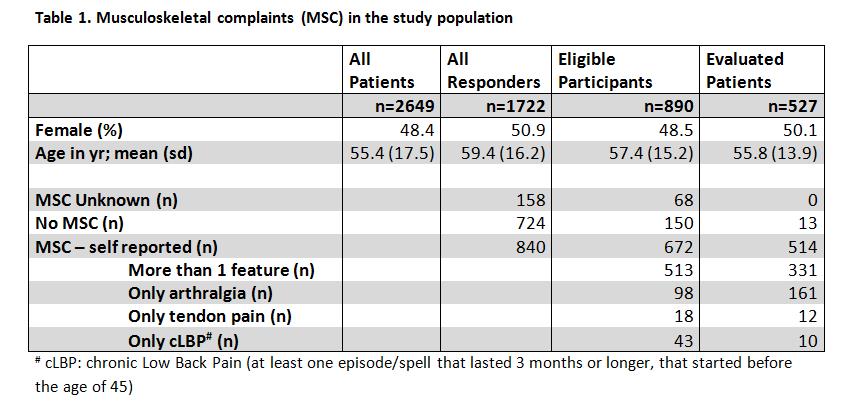Session Information
Session Type: Abstract Submissions (ACR)
Background/Purpose
Musculoskeletal complaints(MSC) account for about 10% of the General Practitioner (GP) consultations1, in a small percentage the underlying disease is psoriatic arthritis (PsA). Evidence suggests that when a psoriasis patient visits the GP with MSCs, GP’s don’t always link the existing psoriasis with the MSC limiting early referral of PsA. This may be explained by the limited knowledge about the frequency of MSC and PsA in psoriasis patients in primary care.2,3
Our objective was to estimate the prevalence of MSC and PsA in primary care patients with psoriasis.
Methods
We conducted a cross-sectional study in adult primary care patients with psoriasis. Patients were identified from GP records by ICPC code S91 for psoriasis. Responding patients reporting pain in joints, entheses or the lower back were checked on eligibility by a telephone interview and invited for clinical evaluation. Ultrasonoghraphy (US) of the enthesis was performed if a patient had at least one tender enthesis (LEI/MASES) by an independent trained examiner. Patients were referred to a rheumatologist if clinical evaluation suggested the presence of arthritis or axial disease or ultrasonography of the enthesis showed positive Power Doppler(PD) signal. A PsA case was defined by opinion of the rheumatologist or fulfilling the CASPAR criteria with PD signal in an enthesis on US.
Results
649 psoriasis (PsO) patients from 97 GPs were invited (Table 1). Of the 1722 responders (65.0 %), 890(51.7%) were willing to participate of which 672 (75.5%) reported MSC at the telephone interview (TI) and 527 were clinically evaluated. 145 out of the 672 patients dropped out between TI and the visit, mostly without giving any reason. The 832 patients that did not want to participate reported MSC in 19.7% (n=164) on the reply slip.
Among the 527 patients we found 54 new cases of PsA(10.2%): inflammatory arthritis (n=11), axial disease (n=3), enthesitis (n=37; confirmed by US) and a combination of symptoms(n=3). Another 62 existing PsA patients were identified. This led to a prevalence of 6.7% among PsO patients that responded (n=1722) and 4.4% among all invited PsO patients (n=2649) assuming no additional cases in the non-responders (Table 2).
Conclusion
Among psoriasis patients with musculoskeletal complaints in primary care (n=836) the prevalence of PsA is estimated to be 13.8% (95%CI 11.6%-16.2%), which would decrease to 4.4% (95% CI 3.7%-5.2%) among all PsO patients if no additional cases would be observed in the non-responders. Besides 54 of the 116 cases (46.6%) hadn’t been diagnosed before our study, this indicates underdiagnosis of PsA in primary care.
Disclosure:
M. C. Karreman,
None;
A. E. A. M. Weel,
None;
M. van der Ven,
None;
M. Vis,
None;
I. Tchetverikov,
None;
T. E. C. Nijsten,
None;
J. M. W. Hazes,
None;
J. J. Luime,
Pfizer bv,
2.
« Back to 2014 ACR/ARHP Annual Meeting
ACR Meeting Abstracts - https://acrabstracts.org/abstract/musculoskeletal-complaints-and-psoriatic-arthritis-in-primary-care-patients-with-psoriasis/


